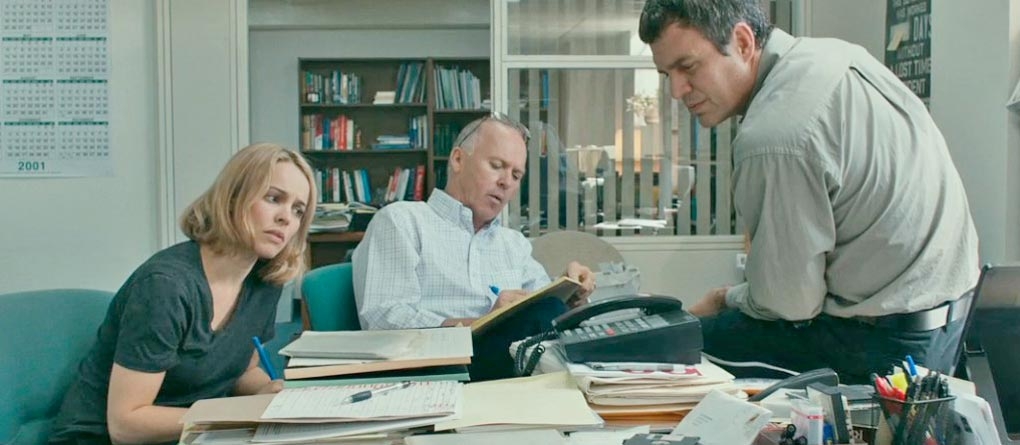Spotlight is ‘a quietly triumphant depiction of the nuts and bolts of investigative journalism’ says MacDara Conroy
For a film like Spotlight, there can be no spoilers, because knowing the story is kind of the whole point. The Boston Globe’s lauded 2002 investigation of widespread sexual abuse committed by Catholic clergy is its subject matter; dramatising how we got there is the film’s sole purpose. There should be no surprises as to how the story plays out.
So if it’s not that kind of film, then what is it? The subject is a weighty one, and one known all too well in Ireland since the Brendan Smyth case 25 years ago, and more lately across the Irish Sea with the Jimmy Savile horrors. But it’s not really about that, either. Some critics have complained that Tom McCarthy’s film ignores the real victims of despicable crimes in favour of lionising Fourth Estate back-patters, though there’s no sense of that in the finished product, and as if there is no room to explore that side of every multifaceted major news story: the grunt work of the journalists who make it happen. The hero is the story itself.
And that’s the real meat of the matter here. As Fintan O’Toole says, Spotlight is a film “about what good journalism is actually like – no heroes, no Deep Throat, just hard slog.” It’s natural that he would make allusion to All The President’s Men, as it shares with Spotlight an ostensibly similar plot (intrepid investigative journalists bristle against the power structures of the day in their quest for the truth). But on closer inspection, their execution is very different.
Alan J Pakula’s classic thriller is very much a heroes-against-villains piece, with Robert Redford and Dustin Hoffman facing insurmountable odds against a political Goliath shrouded in intrigue. Things are slightly more abstract in Spotlight. Yes, there’s an easy narrative hook in the notion of a new editor (Liev Schreiber) shaking things up with his outsider’s perspective when he tasks the investigative editor (Michael Keaton) and his team (among them Mark Ruffalo and Rachel McAdams) to see if there’s more to a columnist’s outcry over a paedophile priest than what meets the eye.
Yet there are no shadowy figures in trenchcoats or clandestine midnight rendezvous. The reporters and editors on the titular team are dogged in their work, yet their geeky problem-solving is more akin to modern-day data journalism than anything else. On the other side, the one figure who might be identified as the villain quickly recedes into the background behind a greater threat that isn’t so easily manifest.
At the same time, there is none of that 1970s panache or paranoia about McCarthy’s competent yet workmanlike procedural, with all the look and feel of a random episode of Law & Order were it not for all the star power on display. And make no bones about it, this is very much an actors’ movie for actors, some of them donning their roles like much loved but well-worn suits. John Slattery is basically Roger Sterling transplanted from the ad world to the newsroom, while Michael Keaton – who has a tremendous face, wrinkling wonderfully from leading-man looks into these character parts – did the scrappy editor thing for Ron Howard in the ‘90s. Stanley Tucci is a little too eccentric as a lawyer standing up for victims’ rights, Ruffalo a tad much with his nervous energy towards the end. An understated Rachel McAdams ironically stands out for her conscious effort to not Act with a capital A.
And yet they work so well as an ensemble that none of those issues are to take away from Spotlight as a quietly triumphant depiction of the nuts and bolts of investigative journalism, where the only goal is to out the truth. It strives not to lionise the editors or reporters who dig up the facts, nor to pretend that their work is ever done. The hero is the story itself.
Spotlight opens nationwide on Friday January 29th


